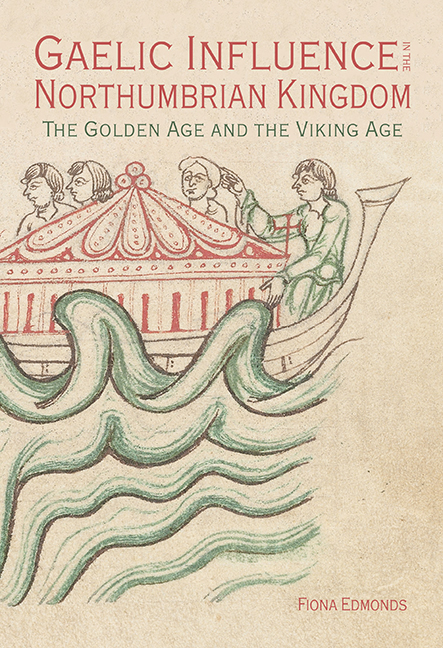Book contents
- Frontmatter
- Contents
- List of Illustrations
- Acknowledgements
- List of Abbreviations
- Preface: An Eventful Voyage
- 1 Concepts and Historiography of the Northumbrian and Gaelic Worlds: Medieval to Modern
- 2 Exiles and Emperors: Gaelic-Northumbrian Political Relations in the Golden Age
- 3 Fragmentation and Opportunity: From the Eighth Century to the Viking Age
- 4 Pathways through the Past: Routes between the Gaelic World and the Northumbrian Kingdom
- 5 A Golden Age of Ecclesiastical Contacts
- 6 Saints and Seaways in the Viking Age
- 7 Medieval Multilingualism: Gaelic Linguistic Influence in the Northumbrian Kingdom
- 8 Movement and Material Culture in the Northumbrian and Gaelic Worlds
- Conclusion: Individuals and Influences
- Bibliography
- Index
- STUDIES IN CELTIC HISTORY
2 - Exiles and Emperors: Gaelic-Northumbrian Political Relations in the Golden Age
Published online by Cambridge University Press: 28 February 2020
- Frontmatter
- Contents
- List of Illustrations
- Acknowledgements
- List of Abbreviations
- Preface: An Eventful Voyage
- 1 Concepts and Historiography of the Northumbrian and Gaelic Worlds: Medieval to Modern
- 2 Exiles and Emperors: Gaelic-Northumbrian Political Relations in the Golden Age
- 3 Fragmentation and Opportunity: From the Eighth Century to the Viking Age
- 4 Pathways through the Past: Routes between the Gaelic World and the Northumbrian Kingdom
- 5 A Golden Age of Ecclesiastical Contacts
- 6 Saints and Seaways in the Viking Age
- 7 Medieval Multilingualism: Gaelic Linguistic Influence in the Northumbrian Kingdom
- 8 Movement and Material Culture in the Northumbrian and Gaelic Worlds
- Conclusion: Individuals and Influences
- Bibliography
- Index
- STUDIES IN CELTIC HISTORY
Summary
Movements of people along ancient pathways and seaways often take on a timeless air, yet cultural influence occurred against a backdrop of rapid political change. Marriage alliances, court intrigues and great battles played their parts in determining the strength of ties between different parts of the Insular world. In this chapter I examine the political dimension of Gaelic influence in the Northumbrian kingdom, and provide a chronological framework for the thematic studies that I tackle elsewhere in this book.
The main sources of information about political vicissitudes are texts, especially chronicles, but there are limitations to what they reveal about Northumbrian–Gaelic contact. The ecclesiastical context of chronicling affected the type of information recorded; battles tended to be interpreted through the lens of biblical parallels or as signs of the coming apocalypse. By the late seventh century, churchmen were cultivating skills for interpreting scripture and dating Easter, including computus. Easter tables might be annotated with references to events and reigns, and such records arguably underpinned annals, along with other material such as late-Roman chronicles. Bede is a striking example of a scholar whose expertise in computus influenced his chronicling activity, and he incorporated chronicles into his computistical treatises De temporibus (703) and De temporum ratione (725). Bede also appended a series of annals to Historia ecclesiastica, and his example was followed by a later copyist (most likely based in York), whose continuations to 766 appear in a select group of continental manuscripts. These ‘northern annals’ were continued further, to at least 802, and they have been attributed to the circle of the great scholar Alcuin of York on the basis of Latin style and points of detail. The annals were incorporated into a late-tenth-century historical miscellany, twelfth-century northern texts and the northern recension of the Anglo-Saxon Chronicle, which most probably emerged in York in the early eleventh century. There is something of a lacuna in Northumbria’s history in the early ninth century, until a later set of northern annals (888–957) becomes available. This text was incorporated the compendious twelfth-century work Historia regum, which was most likely written by Symeon of Durham. These annals also informed the ‘northern recension’ of the Anglo-Saxon Chronicle.
- Type
- Chapter
- Information
- Gaelic Influence in the Northumbrian KingdomThe Golden Age and the Viking Age, pp. 23 - 44Publisher: Boydell & BrewerPrint publication year: 2020

